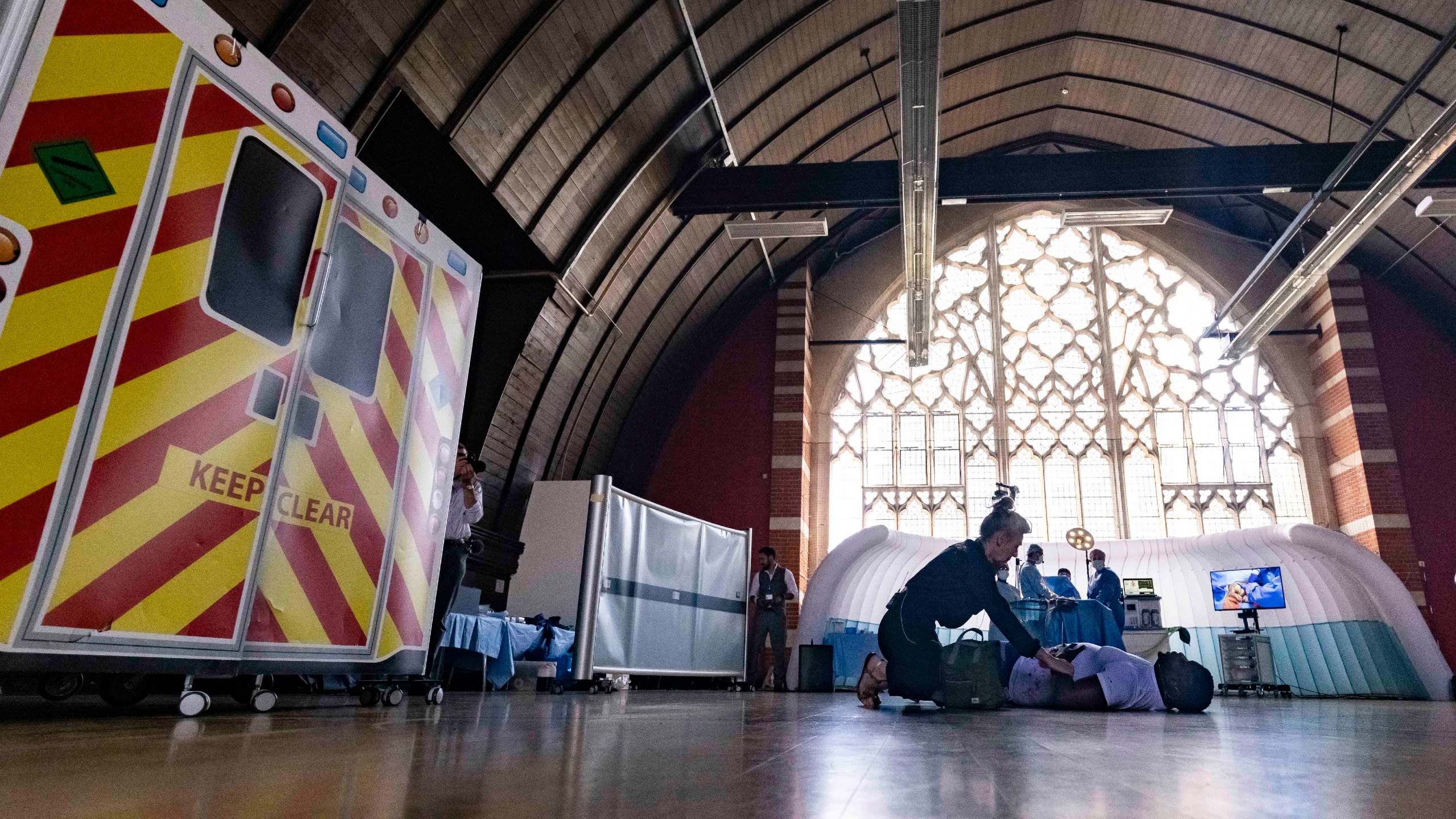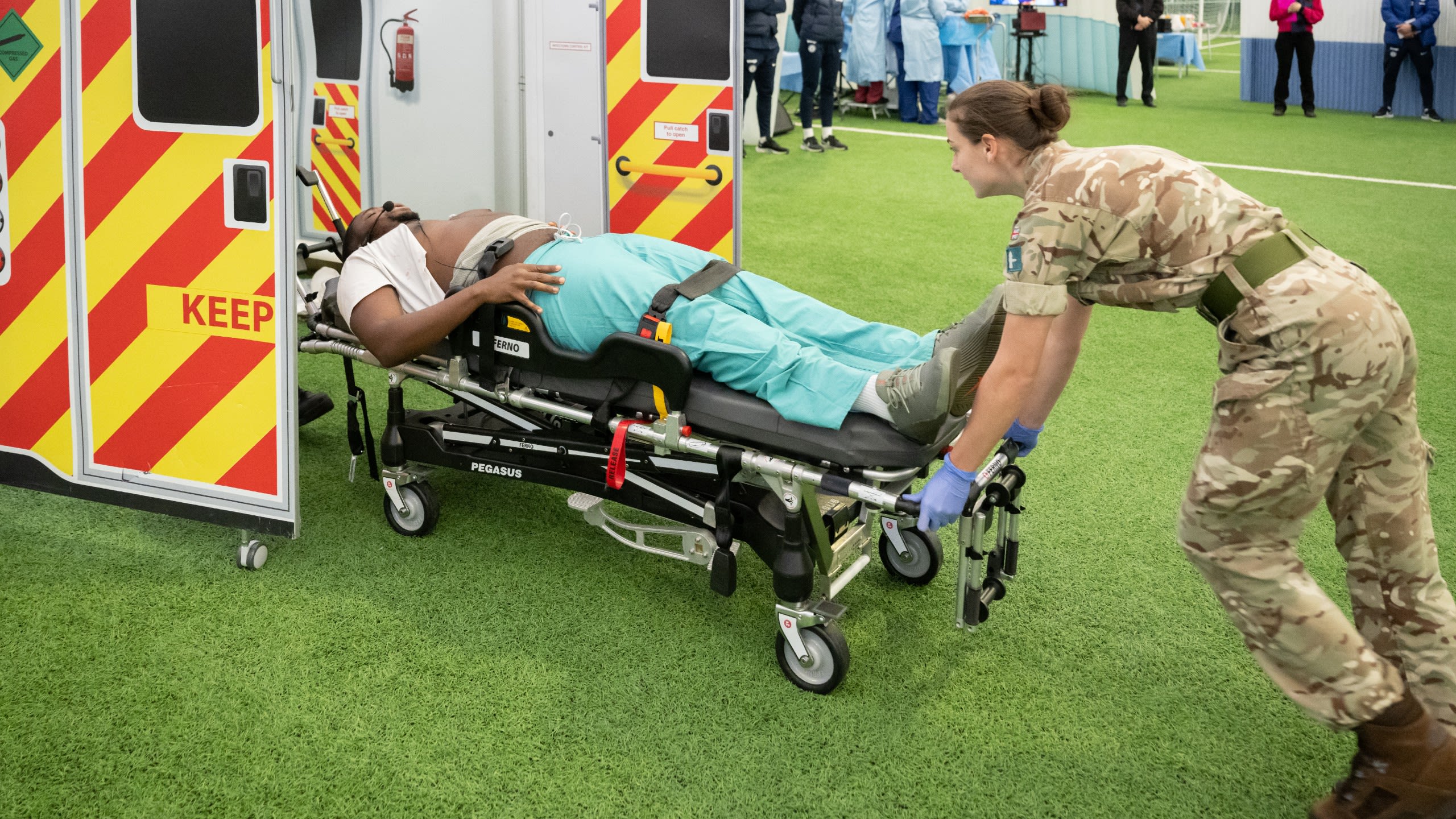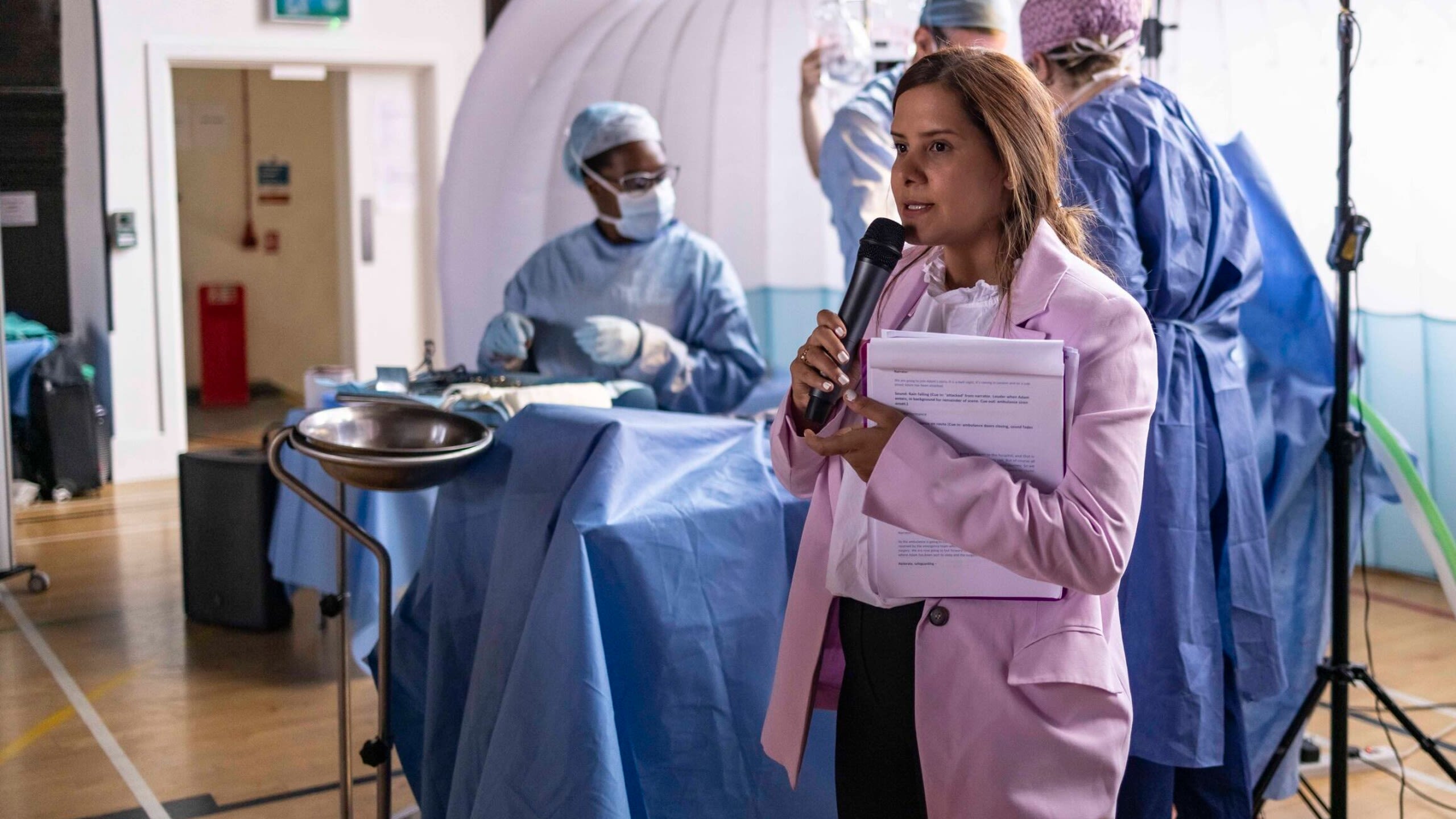SHARP: an innovative
approach to tackling
knife crime
Imperial-led research is showing how medical simulation can help
young people understand the long-term impacts of knife crime.

It is easy to understand why knife crime has been at the forefront of public concerns in recent years. In London alone, figures show there were 13,503 knife-enabled crimes between July 2022 and June 2023 – an increase of 21 per cent on the previous 12-month period. Although knife crime dropped in 2020 during a year of COVID-19 lockdowns and social distancing measures, incidents have risen each year since the pandemic.
Concerns around knife crime are heightened by the risk of young people becoming the victims of such attacks. According to the anti-knife crime charity The Ben Kinsella Trust, 99 young people under the age of 25 were murdered with a knife or sharp object in the 12 months to March 2022, with 13 of these people being under the age of 16.
It was figures like these that led Imperial’s Professor Roger Kneebone and Professor Fernando Bello to create the ‘Simulation-based Holistic Approach for Reducing and Preventing Knife Violence’ or, more simply, the SHARP project.
Working with a team of medical professionals, simulation experts, researchers and actors at Imperial’s Centre for Engagement and Simulation Science (ICCESS), Professor Kneebone and Professor Bello have created a workshop which collaborates with community groups and schools to help young people learn more about the long-term impacts of knife crime.
The workshop uses a combination of virtual reality (VR), medical simulation and artistic displays to help young people make safe and informed decisions by educating them on the lasting consequences of carrying and using a knife.


The core ICCESS team - consisting of Dr Sofia Chacon Gonzalez, Lead Project Researcher and Paediatric Surgeon; Dr Reza Haghighi Osgouei, research associate in Virtual reality (VR) researcher, and Agni Lahiri, simulation technician - have delivered the programme to nearly 600 students from 15 schools across London and youth clubs.
Bringing together expertise from different backgrounds, such as actors, alongside real-life paramedics, doctors, surgeons, artists, performers, young ambassadors, and charity organisations, SHARP captures the journey of a knife crime victim, from the first contact between a patient and a paramedic to the long-term emotional and physical impacts of a knife attack. The project does so using innovative approaches, including VR, physical simulation and artworks.
The simulation begins with a young man entering with a stab wound. He is treated at the scene by a paramedic and taken to an ambulance for immediate care, then to an operating theatre for life-saving surgery and a hospital recovery room where he and his mother begin to come to terms with his life-changing injuries. The audience are then given an opportunity to rotate through the three settings and speak to the SHARP team members who share their experiences of knife crime.

Engaging young people

The idea for SHARP follows a long history of work in public engagement and in developing approaches to medical simulation. In 2012, Professor Kneebone was awarded an engagement fellowship at the Wellcome Trust, where he and his colleagues began delivering simulations at both large and small-scale public events on a variety of medical conditions, including heart attacks, asthma, and knife injury.
“The idea of looking at what happens when somebody gets stabbed was something that we started looking at in several of these science fairs, with members of the general public and young people,” he said.
The ICCESS team then developed some taster engagement workshops aimed at young people who were at risk of becoming involved in knife crime, testing out ideas for a potential future project. “The penny dropped with me that there was actually a huge need that could be addressed here, so we started looking at how this issue was being addressed,” Professor Kneebone said.
An awful lot of the work that was being done, much of it very good in many ways, was largely wagging fingers at people and saying, ‘don't carry a knife’...
A key idea for SHARP is the concept of ‘reciprocal illumination’, where people are presented with a new piece of information and encouraged to exchange ideas on it. The hope is that this type of interaction can help participants understand lessons more deeply, compared to just being told information.
“An awful lot of the work that was being done, much of it very good in many ways, was largely wagging fingers at people and saying, ‘don't carry a knife’,” Professor Kneebone explained.
“I wanted to explore how we could use the ideas that I'd been developing for years around public engagement for this issue.”
Agni Lahiri, a Simulation Technician for SHARP, said: “ICCESS has pioneered various simulation methods like Sequential Simulation (SqS) and Distributed Simulation (DS) to demystify complex medical pathways. In SHARP, these techniques were instrumental in creating an immersive learning environment.
“We swiftly replicated realistic scenarios, including an ambulance scene, an operating theatre, and a hospital recovery room, vividly illustrating the journey of a knife attack victim. This holistic setup not only showcased the diverse expertise required in emergency medical response but also resonated deeply with the young participants, making the life-saving process both tangible and memorable.”

Professor Roger Kneebone, one of the leaders of the SHARP project.
Professor Roger Kneebone, one of the leaders of the SHARP project.

Developing the workshop

SHARP began with a couple of charity partners, including The Prince’s Trust and The Change Foundation, and later received support from the Youth Endowment Fund and the Mayor of London’s Violence Reduction Unit.
The original plan for the project was to take a customised van around schools in West London, but the first COVID-19 lockdown in March 2020 forced this plan to change. From then on, the project was adapted into two phases.
Phase 1 was delivered to over 200 students in 11 schools in West London as a half-day workshop. A VR sequence, developed by Professor Bello, shows the story of Adam – a real young man who shared his experience with the SHARP team – and his journey through the healthcare system after being stabbed. Although the story is real, the name of the young man was changed in the VR sequence to protect their privacy.
The VR experience from the SHARP project
Dr Reza Haghighi Osgouei, a VR researcher for SHARP, said that the project had evolved the use of VR from technical simulations to storytelling to tackle the complex issue of knife violence.
“This approach gives young people an immersive experience, making the consequences of knife crime more tangible and thought-provoking than traditional methods,” Dr Haghighi Osgouei added.
“Notably, participants' reactions during VR – varying from empathy to bravado – provided unique insights into their perspectives on knife violence, enhancing our workshop discussions and overall impact of the project.”
However, the team wanted to go beyond just showing the stabbing to draw out a greater response from the children who had taken part in the VR sequence. They brought in Medical Illustrator Merlin Evans to conduct an arts-based reflection – a unique way of receiving the young people’s interpretations of the scenes they had witnessed.

Phase 2 took place after the national lockdown had lifted, operating on a much larger scale. Using the Sequential Simulation techniques developed by the team, Adam’s story was taken beyond VR and transformed into a live simulation, with a cast of actors, paramedics, doctors and surgeons bringing the story to life.
Continuing with the artistic element of the first phase, Phase 2 also presents the young people with Somebody – a textile ‘book’ exploring the layers of the human body after being stabbed. Made by artist Fleur Oakes, it is designed to help SHARP participants think more deeply about the effects of being stabbed.
The 'Somebody' book from the SHARP project
“Our close engagement with young people has provided profound perspectives into their lives and communities, shedding light on the underlying reasons behind the challenges of knife violence,” Dr Sofia Chacon Gonzalez, Lead Project Researcher for SHARP and Paediatric Surgeon, said.
“Witnessing the impact of our intervention on dispelling preconceptions, particularly regarding the role of medicine, has been incredibly rewarding. We are at an early stage, but hopefully we have been able to guide them towards alternative paths away from knife violence, empowering them to make conscious and better-informed choices for a safer future.”

Next steps

While work on this side of the SHARP project continues, Professor Kneebone and Professor Bello are now keen to develop a second simulation on the impacts of knife crime – this time looking at those holding the knife in an attack.
The SHARP team is keen to note that it is not just the life of the victim that is profoundly changed after an attack. And in some cases, the person who is carrying the knife may be too young to fully understand the consequences of their actions.
"What we’re looking at here is one part of the picture. The other side is the story of the person who did the stabbing, because that is very different,” Professor Kneebone explained.
“Instead of ambulance, hospital, recovery, it is police, arrest, remand, court, and, very often, prison for many, many years.”
BBC London visited a school in the capital in November 2023 to see the SHARP project in action.
Professor Kneebone added: “One of the things we are very keen to do is to use our approach with simulation to give people a sense of both pathways and an understanding of what lies ahead. As we say in the project, two lives change in an instant when somebody gets stabbed.”
The SHARP team are seeking further funding to roll out and scale up the knife injury (medical) pathway and to develop the knife crime (justice) pathway in tandem – creating a unique programme which addresses one of the most devastating social challenges of our time.

